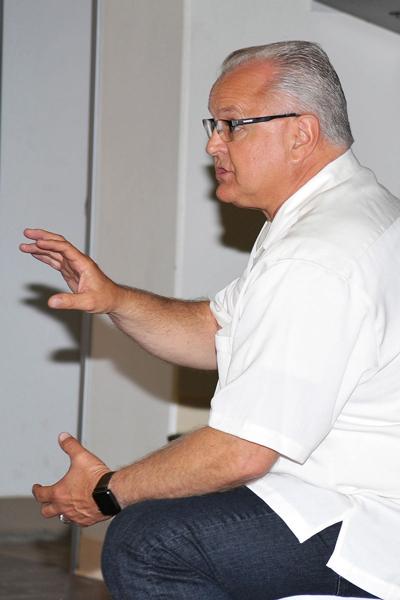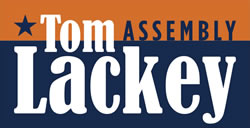Lackey was speaking at a Community Coffee in the Community Arts Center at Central Park where he provided an update on events in Legislature and answered questions from the audience. About a dozen people from California City, Boron and Mojave showed up for the opportunity to meet with Lackey. The program lasted more than an hour, with Lackey talking on a wide range of subjects.
“It should be the people speaking and the people should be the ones that run the show,” he said. “The government should react to the people, but it’s kind of changing a bit. In this country, the government was created to represent the people. Now the government is telling people (what to do) instead of providing people with what they deserve – at least that’s my view.”
Former California City Mayor Jennifer Wood asked about Senate Bill 1 – the Road Repair and Accountability Act of 2017, also known as the gas tax bill – and if California City could expect to see any benefit from the bill. SB1 was listed as a legislative package to invest $54 billion over a decade to fix roads, freeways and bridges in communities across California, the funds were to be equally split between state and local investments.
“SB1 was very problematic and the people had a chance to address that through an initiative,” said Lackey, speaking about 2018’s Proposition 6 which would have repealed the gas tax. “Because of the way the initiative was worded, it misled some people. This Legislature can’t seem to get enough income from people. We already have surpluses. we have multi billion dollar surpluses again this year, why are we worried about getting more and more. They just have an appetite that never seems to be satisfied and no one seems to be able to put any kind of brakes on it. The gas tax should be a very good wakeup call, especially when you live in rural areas. Because we don’t drive just for pleasure, we drive for purpose. Urban policy is different – those folks have transportation systems, they have alternatives. Stuff is close, so they can either walk or ride a bike. They’re trying to pass these statewide measures about bicycle riding – you know, come to Cal City, ride your bike to Mojave – see how that works. Against the wind, or when it’s 102. What fits in an urban setting doesn’t necessarily fit in our situation. It’s supposed to be the state legislature, not urban legislature.”
As vice chairman of the Public Safety Committee, Lackey says he is concerned with some developments there as well.
“I’m telling you, it is amazing stuff that’s happening and the policy that’s being developed,” he said. “They should change the name of that committee to inmate safety because that’s what they’re concerned about, people who are incarcerated. Everybody wants rehabilitation, but I’m, I’m all for prevention and trying to hold people accountable.
“We’re living in very difficult time, where perspectives that don’t really reflect what I think is the most beneficial to society are really starting to become a reality. The natural consequences of that are going to be sad. And I think that there will be a reversal, people will start to want to correct it and say, Hey, guys, we did this and look what happened.”
According to Lackey, community involvement and partnerships are the best way to get something accomplished.
“The best thing to do is get engaged in your own community, first of all,” he said. “We need to partner, man. The next layer would be getting involved with your county and hold your county supervisor accountable. I would be the next layer, because I’m the state. You should pay attention to every one of those layers, but most important is your local stuff – that’s how you make a difference.”
Lackey has represented California’s 36th Assembly District since 2014. Before joining the Assembly, he served on the Palmdale Elementary School District Board of Trustees and the Palmdale City Council. After high school, he served as a missionary for two years before he earned a bachelor’s degree in special education from Utah State University. Lackey later worked as an elementary special education teacher before beginning a 28-year career with the California Highway Patrol.
